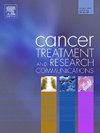An investigation into the manganese superoxide dismutase (MnSOD Val-9Ala) gene polymorphisms employing high-resolution melting in patients with gastric cancer: A preliminary study
IF 2.4
Q3 Medicine
引用次数: 0
Abstract
Background: Gastric cancer with complex carcinogenesis and a multi-factorial immunopathophysiology is well-known as the third life-threatening type of cancer in Asia. In this regard, it has been demonstrated that the role of Reactive Oxygen Species (ROS) in these processes should not be underestimated. Besides, mitochondrial Manganese Superoxide Dismutase (MnSOD) with antioxidant properties show protective effects against ROS. On the other hand, MnSOD catalyzes the dismutation of superoxide radicals to H2O2 and oxygen reactions. A replacement of T with C at nucleotide 47 (Val-9Ala) leads to a change in MnSOD nascent protein signal sequences and builds a relationship with gastric cancer. Therefore, the authors aimed at investigating the Single Nucleotide Polymorphisms (SNPs) in patients with gastric cancer by employing High-Resolution Melting.
Methodology: In order to investigate the (T/C) polymorphisms of MnSOD, the genomic DNA of 30 paraffin-embedded tissue samples were collected from patients with gastric cancer and 30 healthy people, respectively. An investigation was conducted into the T/C polymorphisms of MnSOD by employing High Resolution Melting (HRM) in different melting temperatures (Tm). Afterward, the sequencing was carried out.
Results: Our findings obtained from HRM methods confirmed the SNP genotypes in each group. It is worth mentioning that frequencies of Ala/Ala, Ala/Val, and Val/Val genotypes in MnSOD in the healthy group were 13 (43.3 %), 13 (43.3 %), and 4 (13.3 %), respectively. On the other hand, in the understudy case group, frequencies for the aforementioned genotypes were 5 (16.6 %), 16 (53.3 %), and 9 (30 %), respectively. Besides, the frequencies of the Ala allele in gastric cancer were reported to be 43 % and 54 % for healthy people. Frequencies for the Val allele in the studied case and the control groups were 44 % and 56 %, respectively. The sensitivity and the specificity of the HRM method in detecting MnSOD SNPs were reported to be 100 %.
Conclusion: by taking into account the contributing roles of MnSOD SNPs in the induction of gastric cancer, it is highly recommended to create collaboration among basic medical scientists, geneticists, gastroenterologists, medical laboratory scientists, pathologists, and hematologists for more promising results and improved outcome of the diagnosis. Accordingly, we conducted an investigation with diagnostic purposes into the frequencies in SNPs for patients with gastric cancer.

高分辨率熔解法研究胃癌患者锰超氧化物歧化酶(MnSOD Val-9Ala)基因多态性的初步研究
背景:胃癌具有复杂的癌变机制和多因素的免疫病理生理,是亚洲已知的第三种危及生命的癌症。在这方面,已经证明活性氧(ROS)在这些过程中的作用不应被低估。此外,线粒体锰超氧化物歧化酶(MnSOD)具有抗氧化作用,对活性氧具有保护作用。另一方面,MnSOD催化超氧自由基裂解为H2O2和氧反应。47 (Val-9Ala)核苷酸上的T被C取代导致MnSOD新生蛋白信号序列的改变,并与胃癌建立了关系。因此,作者旨在利用高分辨率熔融技术研究胃癌患者的单核苷酸多态性(snp)。方法:为研究MnSOD的(T/C)多态性,分别采集胃癌患者和30名健康人群石蜡包埋组织标本30份。采用高分辨率熔融(HRM)技术研究了MnSOD在不同熔融温度(Tm)下的T/C多态性。随后,进行了测序。结果:我们通过HRM方法获得的结果证实了各组的SNP基因型。值得一提的是,健康组MnSOD中Ala/Ala、Ala/Val和Val/Val基因型的频率分别为13(43.3%)、13(43.3%)和4(13.3%)。另一方面,在understudy病例组中,上述基因型的频率分别为5(16.6%),16(53.3%)和9(30%)。此外,据报道,Ala等位基因在胃癌中的频率为43%,在健康人群中为54%。Val等位基因在研究病例和对照组中的频率分别为44%和56%。据报道,HRM法检测MnSOD snp的敏感性和特异性均为100%。结论:考虑到MnSOD snp在胃癌诱导中的贡献作用,强烈建议在基础医学科学家、遗传学家、胃肠病学家、医学实验室科学家、病理学家和血液学家之间建立合作,以获得更有希望的结果,提高诊断结果。因此,我们对胃癌患者的snp频率进行了一项具有诊断目的的调查。
本文章由计算机程序翻译,如有差异,请以英文原文为准。
求助全文
约1分钟内获得全文
求助全文
来源期刊

Cancer treatment and research communications
Medicine-Oncology
CiteScore
4.30
自引率
0.00%
发文量
148
审稿时长
56 days
期刊介绍:
Cancer Treatment and Research Communications is an international peer-reviewed publication dedicated to providing comprehensive basic, translational, and clinical oncology research. The journal is devoted to articles on detection, diagnosis, prevention, policy, and treatment of cancer and provides a global forum for the nurturing and development of future generations of oncology scientists. Cancer Treatment and Research Communications publishes comprehensive reviews and original studies describing various aspects of basic through clinical research of all tumor types. The journal also accepts clinical studies in oncology, with an emphasis on prospective early phase clinical trials. Specific areas of interest include basic, translational, and clinical research and mechanistic approaches; cancer biology; molecular carcinogenesis; genetics and genomics; stem cell and developmental biology; immunology; molecular and cellular oncology; systems biology; drug sensitivity and resistance; gene and antisense therapy; pathology, markers, and prognostic indicators; chemoprevention strategies; multimodality therapy; cancer policy; and integration of various approaches. Our mission is to be the premier source of relevant information through promoting excellence in research and facilitating the timely translation of that science to health care and clinical practice.
 求助内容:
求助内容: 应助结果提醒方式:
应助结果提醒方式:


